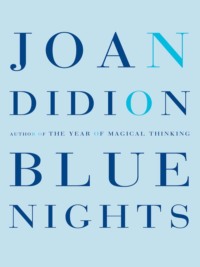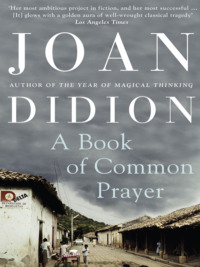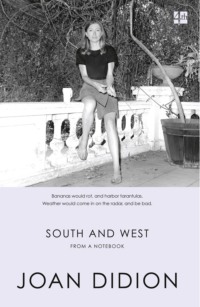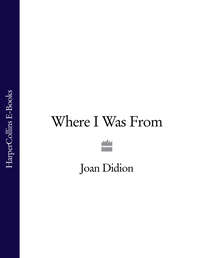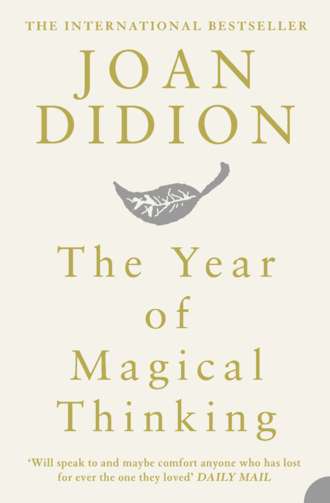
Полная версия
The Year of Magical Thinking
I remember thinking that I needed to discuss this with John.
There was nothing I did not discuss with John.
Because we were both writers and both worked at home our days were filled with the sound of each other’s voices.
I did not always think he was right nor did he always think I was right but we were each the person the other trusted. There was no separation between our investments or interests in any given situation. Many people assumed that we must be, since sometimes one and sometimes the other would get the better review, the bigger advance, in some way “competitive,” that our private life must be a minefield of professional envies and resentments. This was so far from the case that the general insistence on it came to suggest certain lacunae in the popular understanding of marriage.
That had been one more thing we discussed.
What I remember about the apartment the night I came home alone from New York Hospital was its silence.
In the plastic bag I had been given at the hospital there were a pair of corduroy pants, a wool shirt, a belt, and I think nothing else. The legs of the corduroy pants had been slit open, I supposed by the paramedics. There was blood on the shirt. The belt was braided. I remember putting his cell phone in the charger on his desk. I remember putting his silver clip in the box in the bedroom in which we kept passports and birth certificates and proof of jury service. I look now at the clip and see that these were the cards he was carrying: a New York State driver’s license, due for renewal on May 25, 2004; a Chase ATM card; an American Express card; a Wells Fargo MasterCard; a Metropolitan Museum card; a Writers Guild of America West card (it was the season before Academy voting, when you could use a WGAW card to see movies free, he must have gone to a movie, I did not remember); a Medicare card; a Metro card; and a card issued by Medtronic with the legend “I have a Kappa 900 SR pacemaker implanted,” the serial number of the device, a number to call for the doctor who implanted it, and the notation “Implant Date: 03 Jun 2003.” I remember combining the cash that had been in his pocket with the cash in my own bag, smoothing the bills, taking special care to interleaf twenties with twenties, tens with tens, fives and ones with fives and ones. I remember thinking as I did this that he would see that I was handling things.
When I saw him in the curtained cubicle in the emergency room at New York Hospital there was a chip in one of his front teeth, I supposed from the fall, since there were also bruises on his face. When I identified his body the next day at Frank E. Campbell the bruises were not apparent. It occurred to me that masking the bruises must have been what the undertaker meant when I said no embalming and he said “in that case we’ll just clean him up.” The part with the undertaker remains remote. I had arrived at Frank E. Campbell so determined to avoid any inappropriate response (tears, anger, helpless laughter at the Oz-like hush) that I had shut down all response. After my mother died the undertaker who picked up her body left in its place on the bed an artificial rose. My brother had told me this, offended to the core. I would be armed against artificial roses. I remember making a brisk decision about a coffin. I remember that in the office where I signed the papers there was a grandfather’s clock, not running. John’s nephew Tony Dunne, who was with me, mentioned to the undertaker that the clock was not running. The undertaker, as if pleased to elucidate a decorative element, explained that the clock had not run in some years, but was retained as “a kind of memorial” to a previous incarnation of the firm. He seemed to be offering the clock as a lesson. I concentrated on Quintana. I could shut out what the undertaker was saying but I could not shut out the lines I was hearing as I concentrated on Quintana: Full fathom five thy father lies / Those are pearls that were his eyes.
Eight months later I asked the manager of our apartment building if he still had the log kept by the doormen for the night of December 30. I knew there was a log, I had been for three years president of the board of the building, the door log was intrinsic to building procedure. The next day the manager sent me the page for December 30. According to the log the doormen that night were Michael Flynn and Vasile Ionescu. I had not remembered that. Vasile Ionescu and John had a routine with which they amused themselves in the elevator, a small game, between an exile from Ceauşescu’s Romania and an Irish Catholic from West Hartford, Connecticut, based on a shared appreciation of political posturing. “So where is bin Laden,” Vasile would say when John got onto the elevator, the point being to come up with ever more improbable suggestions: “Could bin Laden be in the penthouse?” “In the maisonette?” “In the fitness room?” When I saw Vasile’s name on the log it occurred to me that I could not remember if he had initiated this game when we came in from Beth Israel North in the early evening of December 30. The log for that evening showed only two entries, fewer than usual, even for a time of the year when most people in the building left for more clement venues:
NOTE: Paramedics arrived at 9:20 p.m. for Mr. Dunne. Mr. Dunne was taken to hospital at 10:05 p.m.
NOTE: Lightbulb out on Α-B passenger elevator.
The Α-B elevator was our elevator, the elevator on which the paramedics came up at 9:20 p.m., the elevator on which they took John (and me) downstairs to the ambulance at 10:05 p.m., the elevator on which I returned alone to our apartment at a time not noted. I had not noticed a lightbulb being out on the elevator. Nor had I noticed that the paramedics were in the apartment for forty-five minutes. I had always described it as “fifteen or twenty minutes.” If they were here that long does it mean that he was alive? I put this question to a doctor I knew. “Sometimes they’ll work that long,” he said. It was a while before I realized that this in no way addressed the question.
The death certificate, when I got it, gave the time of death as 10:18 p.m., December 30, 2003.
I had been asked before I left the hospital if I would authorize an autopsy. I had said yes. I later read that asking a survivor to authorize an autopsy is seen in hospitals as delicate, sensitive, often the most difficult of the routine steps that follow a death. Doctors themselves, according to many studies (for example Katz, J. L., and Gardner, R., “The Intern’s Dilemma: The Request for Autopsy Consent,” Psychiatry in Medicine 3:197–203, 1972), experience considerable anxiety about making the request. They know that autopsy is essential to the learning and teaching of medicine, but they also know that the procedure touches a primitive dread. If whoever it was at New York Hospital who asked me to authorize an autopsy experienced such anxiety I could have spared him or her: I actively wanted an autopsy. I actively wanted an autopsy even though I had seen some, in the course of doing research. I knew exactly what occurs, the chest open like a chicken in a butcher’s case, the face peeled down, the scale in which the organs are weighed. I had seen homicide detectives avert their eyes from an autopsy in progress. I still wanted one. I needed to know how and why and when it had happened. In fact I wanted to be in the room when they did it (I had watched those other autopsies with John, I owed him his own, it was fixed in my mind at that moment that he would be in the room if I were on the table) but I did not trust myself to rationally present the point so I did not ask.
If the ambulance left our building at 10:05 p.m., and death was declared at 10:18 p.m., the thirteen minutes in between were just bookkeeping, bureaucracy, making sure the hospital procedures were observed and the paperwork was done and the appropriate person was on hand to do the sign-off, inform the cool customer.
The sign-off, I later learned, was called the “pronouncement,” as in “Pronounced: 10:18 p.m.”
I had to believe he was dead all along.
If I did not believe he was dead all along I would have thought I should have been able to save him.
Until I saw the autopsy report I continued to think this anyway, an example of delusionary thinking, the omnipotent variety.
A week or two before he died, when we were having dinner in a restaurant, John asked me to write something in my notebook for him. He always carried cards on which to make notes, three-by-six-inch cards printed with his name that could be slipped into an inside pocket. At dinner he had thought of something he wanted to remember but when he looked in his pockets he found no cards. I need you to write something down, he said. It was, he said, for his new book, not for mine, a point he stressed because I was at the time researching a book that involved sports. This was the note he dictated: “Coaches used to go out after a game and say ‘you played great.’ Now they go out with state police, as if this were a war and they the military. The militarization of sports.” When I gave him the note the next day he said “You can use it if you want to.”
What did he mean?
Did he know he would not write the book?
Did he have some apprehension, a shadow? Why had he forgotten to bring note cards to dinner that night? Had he not warned me when I forgot my own notebook that the ability to make a note when something came to mind was the difference between being able to write and not being able to write? Was something telling him that night that the time for being able to write was running out?
One summer when we were living in Brentwood Park we fell into a pattern of stopping work at four in the afternoon and going out to the pool. He would stand in the water reading (he reread Sophie’s Choice several times that summer, trying to see how it worked) while I worked in the garden. It was a small, even miniature, garden with gravel paths and a rose arbor and beds edged with thyme and santolina and feverfew. I had convinced John a few years before that we should tear out a lawn to plant this garden. To my surprise, since he had shown no previous interest in gardens, he regarded the finished product as an almost mystical gift. Just before five on those summer afternoons we would swim and then go into the library wrapped in towels to watch Tenko, a BBC series, then in syndication, about a number of satisfyingly predictable English women (one was immature and selfish, another seemed to have been written with Mrs. Miniver in mind) imprisoned by the Japanese in Malaya during World War Two. After each afternoon’s Tenko segment we would go upstairs and work another hour or two, John in his office at the top of the stairs, me in the glassed-in porch across the hall that had become my office. At seven or seven-thirty we would go out to dinner, many nights at Morton’s. Morton’s felt right that summer. There was always shrimp quesadilla, chicken with black beans. There was always someone we knew. The room was cool and polished and dark inside but you could see the twilight outside.
John did not like driving at night by then. This was one reason, I later learned, that he wanted to spend more time in New York, a wish that at the time remained mysterious to me. One night that summer he asked me to drive home after dinner at Anthea Sylbert’s house on Camino Palmero in Hollywood. I remember thinking how remarkable this was. Anthea lived less than a block from a house on Franklin Avenue in which we had lived from 1967 until 1971, so it was not a question of reconnoitering a new neighborhood. It had occurred to me as I started the ignition that I could count on my fingers the number of times I had driven when John was in the car; the single other time I could remember that night was once spelling him on a drive from Las Vegas to Los Angeles. He had been dozing in the passenger seat of the Corvette we then had. He had opened his eyes. After a moment he had said, very carefully, “I might take it a little slower.” I had no sense of unusual speed and glanced at the speedometer: I was doing 120.
Yet.
A drive across the Mojave was one thing. There had been no previous time when he asked me to drive home from dinner in town: this evening on Camino Palmero was unprecedented. So was the fact that at the end of the forty-minute drive to Brentwood Park he pronounced it “well driven.”
He mentioned those afternoons with the pool and the garden and Tenko several times during the year before he died.
Philippe Ariès, in The Hour of Our Death, points out that the essential characteristic of death as it appears in the Chanson de Roland is that the death, even if sudden or accidental, “gives advance warning of its arrival.” Gawain is asked: “Ah, good my lord, think you then so soon to die?” Gawain answers: “I tell you that I shall not live two days.” Ariès notes: “Neither his doctor nor his friends nor the priests (the latter are absent and forgotten) know as much about it as he. Only the dying man can tell how much time he has left.”
You sit down to dinner.
“You can use it if you want to,” John had said when I gave him the note he had dictated a week or two before.
And then—gone.
Grief, when it comes, is nothing we expect it to be. It was not what I felt when my parents died: my father died a few days short of his eighty-fifth birthday and my mother a month short of her ninety-first, both after some years of increasing debility. What I felt in each instance was sadness, loneliness (the loneliness of the abandoned child of whatever age), regret for time gone by, for things unsaid, for my inability to share or even in any real way to acknowledge, at the end, the pain and helplessness and physical humiliation they each endured. I understood the inevitability of each of their deaths. I had been expecting (fearing, dreading, anticipating) those deaths all my life. They remained, when they did occur, distanced, at a remove from the ongoing dailiness of my life. After my mother died I received a letter from a friend in Chicago, a former Maryknoll priest, who precisely intuited what I felt. The death of a parent, he wrote, “despite our preparation, indeed, despite our age, dislodges things deep in us, sets off reactions that surprise us and that may cut free memories and feelings that we had thought gone to ground long ago. We might, in that indeterminate period they call mourning, be in a submarine, silent on the ocean’s bed, aware of the depth charges, now near and now far, buffeting us with recollections.”
My father was dead, my mother was dead, I would need for a while to watch for mines, but I would still get up in the morning and send out the laundry.
I would still plan a menu for Easter lunch.
I would still remember to renew my passport.
Grief is different. Grief has no distance. Grief comes in waves, paroxysms, sudden apprehensions that weaken the knees and blind the eyes and obliterate the dailiness of life. Virtually everyone who has ever experienced grief mentions this phenomenon of “waves.” Eric Lindemann, who was chief of psychiatry at Massachusetts General Hospital in the 1940s and interviewed many family members of those killed in the 1942 Cocoanut Grove fire, defined the phenomenon with absolute specificity in a famous 1944 study: “sensations of somatic distress occurring in waves lasting from twenty minutes to an hour at a time, a feeling of tightness in the throat, choking with shortness of breath, need for sighing, and an empty feeling in the abdomen, lack of muscular power, and an intense subjective distress described as tension or mental pain.”
Tightness in the throat.
Choking, need for sighing.
Such waves began for me on the morning of December 31, 2003, seven or eight hours after the fact, when I woke alone in the apartment. I do not remember crying the night before; I had entered at the moment it happened a kind of shock in which the only thought I allowed myself was that there must be certain things I needed to do. There had been certain things I had needed to do while the ambulance crew was in the living room. I had needed for example to get the copy of John’s medical summary, so I could take it with me to the hospital. I had needed for example to bank the fire, because I would be leaving it. There had been certain things I had needed to do at the hospital. I had needed for example to stand in the line. I had needed for example to focus on the bed with telemetry he would need for the transfer to Columbia-Presbyterian.
Once I got back from the hospital there had again been certain things I needed to do. I could not identify all of these things but I did know one of them: I needed, before I did anything else, to tell John’s brother Nick. It had seemed too late in the evening to call their older brother Dick on Cape Cod (he went to bed early, his health had not been good, I did not want to wake him with bad news) but I needed to tell Nick. I did not plan how to do this. I just sat on the bed and picked up the phone and dialed the number of his house in Connecticut. He answered. I told him. After I put down the phone, in what I can only describe as a new neural pattern of dialing numbers and saying the words, I picked it up again. I could not call Quintana (she was still where we had left her a few hours before, unconscious in the ICU at Beth Israel North) but I could call Gerry, her husband of five months, and I could call my brother, Jim, who would be at his house in Pebble Beach. Gerry said he would come over. I said there was no need to come over, I would be fine. Jim said he would get a flight. I said there was no need to think about a flight, we would talk in the morning. I was trying to think what to do next when the phone rang. It was John’s and my agent, Lynn Nesbit, a friend since I suppose the late sixties. It was not clear to me at the time how she knew but she did (it had something to do with a mutual friend to whom both Nick and Lynn seemed in the last minute to have spoken) and she was calling from a taxi on her way to our apartment. At one level I was relieved (Lynn knew how to manage things, Lynn would know what it was that I was supposed to be doing) and at another I was bewildered: how could I deal at this moment with company? What would we do, would we sit in the living room with the syringes and the ECG electrodes and the blood still on the floor, should I rekindle what was left of the fire, would we have a drink, would she have eaten?
Had I eaten?
The instant in which I asked myself whether I had eaten was the first intimation of what was to come: if I thought of food, I learned that night, I would throw up.
Lynn arrived.
We sat in the part of the living room where the blood and electrodes and syringes were not.
I remember thinking as I was talking to Lynn (this was the part I could not say) that the blood must have come from the fall: he had fallen on his face, there was the chipped tooth I had noticed in the emergency room, the tooth could have cut the inside of his mouth.
Lynn picked up the phone and said that she was calling Christopher.
This was another bewilderment: the Christopher I knew best was Christopher Dickey, but he was in either Paris or Dubai and in any case Lynn would have said Chris, not Christopher. I found my mind veering to the autopsy. It could even be happening as I sat there. Then I realized that the Christopher to whom Lynn was talking was Christopher Lehmann-Haupt, who was the chief obituary writer for The New York Times. I remember a sense of shock. I wanted to say not yet but my mouth had gone dry. I could deal with “autopsy” but the notion of “obituary” had not occurred to me. “Obituary,” unlike “autopsy,” which was between me and John and the hospital, meant it had happened. I found myself wondering, with no sense of illogic, if it had also happened in Los Angeles. I was trying to work out what time it had been when he died and whether it was that time yet in Los Angeles. (Was there time to go back? Could we have a different ending on Pacific time?) I recall being seized by a pressing need not to let anyone at the Los Angeles Times learn what had happened by reading it in The New York Times. I called our closest friend at the Los Angeles Times, Tim Rutten. I have no memory of what Lynn and I did then. I remember her saying that she would stay the night, but I said no, I would be fine alone.
And I was.
Until the morning. When, only half awake, I tried to think why I was alone in the bed. There was a leaden feeling. It was the same leaden feeling with which I woke on mornings after John and I had fought. Had we had a fight? What about, how had it started, how could we fix it if I could not remember how it started?
Then I remembered.
For several weeks that would be the way I woke to the day.
I wake and feel the fell of dark, not day.
One of several lines from different poems by Gerard Manley Hopkins that John strung together during the months immediately after his younger brother committed suicide, a kind of improvised rosary.
Ο the mind, mind has mountains; cliffs of fall
Frightful, sheer, no- man- fathomed. Hold them cheap
May who ne’er hung there.
I wake and feel the fell of dark, not day.
And I have asked to be
Where no storms come.
I see now that my insistence on spending that first night alone was more complicated than it seemed, a primitive instinct. Of course I knew John was dead. Of course I had already delivered the definitive news to his brother and to my brother and to Quintana’s husband. The New York Times knew. The Los Angeles Times knew. Yet I was myself in no way prepared to accept this news as final: there was a level on which I believed that what had happened remained reversible. That was why I needed to be alone.
After that first night I would not be alone for weeks (Jim and his wife Gloria would fly in from California the next day, Nick would come back to town, Tony and his wife Rosemary would come down from Connecticut, José would not go to Las Vegas, our assistant Sharon would come back from skiing, there would never not be people in the house), but I needed that first night to be alone.
I needed to be alone so that he could come back.
This was the beginning of my year of magical thinking.
3.
The power of grief to derange the mind has in fact been exhaustively noted. The act of grieving, Freud told us in his 1917 “Mourning and Melancholia,” “involves grave departures from the normal attitude to life.” Yet, he pointed out, grief remains peculiar among derangements: “It never occurs to us to regard it as a pathological condition and to refer it to medical treatment.” We rely instead on “its being overcome after a certain lapse of time.” We view “any interference with it as useless and even harmful.” Melanie Klein, in her 1940 “Mourning and Its Relation to Manic-Depressive States,” made a similar assessment: “The mourner is in fact ill, but because this state of mind is common and seems so natural to us, we do not call mourning an illness…. To put my conclusion more precisely: I should say that in mourning the subject goes through a modified and transitory manic-depressive state and overcomes it.”
Notice the stress on “overcoming” it.
It was deep into the summer, some months after the night when I needed to be alone so that he could come back, before I recognized that through the winter and spring there had been occasions on which I was incapable of thinking rationally. I was thinking as small children think, as if my thoughts or wishes had the power to reverse the narrative, change the outcome. In my case this disordered thinking had been covert, noticed I think by no one else, hidden even from me, but it had also been, in retrospect, both urgent and constant. In retrospect there had been signs, warning flags I should have noticed. There had been for example the matter of the obituaries. I could not read them. This continued from December 31, when the first obituaries appeared, until February 29, the night of the 2004 Academy Awards, when I saw a photograph of John in the Academy’s “In Memoriam” montage. When I saw the photograph I realized for the first time why the obituaries had so disturbed me.


